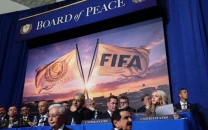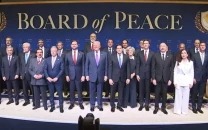Hong Kong silent on Snowden's fate after U.S. files charges
Hong Kong authorities remained silent on the fate of a former (NSA) contractor but said he was under police protection

Hong Kong authorities remained silent on the fate of a former (NSA) contractor but said he was under police protection. PHOTO: REUTERS/FILE
Edward Snowden was charged with theft of U.S. government property, unauthorized communication of national defence information and wilful communication of classified communications intelligence to an unauthorized person, according to the criminal complaint, dated June 14 and made public on Friday.
Two U.S. sources, speaking on condition of anonymity, said the United States was preparing to seek Snowden's extradition from Hong Kong, which is part of China but has wide-ranging autonomy, including an independent judiciary.
Documents leaked by Snowden and revealed by him in Hong Kong showed that the NSA had access to vast amounts of Internet data such as emails, chat rooms and video from large companies such as Facebook and Google, under a government programme known as Prism.
The Washington Post said the United States had asked Hong Kong to detain Snowden on a provisional arrest warrant. Hong Kong Police Commissioner Andy Tsang declined to give details but said Hong Kong would deal with the case in accordance with the law.
"The laws that are enforced in Hong Kong are Hong Kong laws, not foreign laws," he told reporters.
The Apple Daily newspaper said police had provided Snowden with a safe house and protection. Police had checked his documents to make sure he hadn't overstayed but didn't talk to him on other matters or take any statement, the paper said, citing police sources. The U.S. Consulate referred inquiries to the U.S. Department of Justice in Washington.
The United States and Hong Kong signed an extradition treaty which came into effect in 1998, a year after Hong Kong returned from British to Chinese rule.
While espionage and theft of state secrets are not cited specifically, equivalent charges could be pressed against Snowden under Hong Kong's Official Secrets Ordinance, legal experts say. Snowden, however, could claim political asylum. Under article six of the treaty, extradition should be refused for "an offence of a political character".
Legal sources in Hong Kong say Snowden has already approached prominent human rights lawyers in preparation for a protracted extradition battle.
If Hong Kong authorities don't charge him with an equivalent criminal act, authorities cannot arrest or take legal action. He was also theoretically free to leave the city, one legal expert said.
Simon Young, a law professor at the University of Hong Kong, said a formal extradition request would likely be made through diplomatic channels to Hong Kong's chief executive, who must decide whether or not to issue an "authority to proceed".
A magistrate would then issue a warrant for the arrest and then decide whether there was sufficient evidence to commit Snowden to trial.
While China has veto power over extradition proceedings if its "defence or foreign affairs would be significantly affected", this power has rarely been invoked by Beijing for previous cases involving non-Chinese nationals.
"If he requested asylum, then from a humanitarian standpoint, we should protect him," said 60-year-old resident Elli Fan near a street-side banner saying "Protect Snowden. Protect Freedom."
An Icelandic businessman linked to the anti-secrecy group WikiLeaks said on Thursday he had readied a private plane in China to fly Snowden to Iceland if Iceland's government would grant asylum.



















COMMENTS
Comments are moderated and generally will be posted if they are on-topic and not abusive.
For more information, please see our Comments FAQ